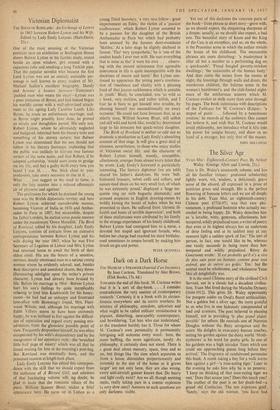Dark on a Dark Horse
Fr IF. HAND OF A STRANGER (Journal d'un htconnu). By Jean Cocteau. Translated by Alec Brown. (Elek Books, 17s. 6d.)
rOWARDS the end of this book, M. Cocteau writes that it is 'a sort of day-book. . . . I consider contradiction the very essence of contemporary research.' Certainly it is a book with its circum- ference cycrywhere and its centre nowhere. Its mixture of philosophy, anecdote, aphorism and what ought to be called militant reminiscence is piquant, disturbing, inescapably contemporary, and bewildering. 'Let him who can understand,' as the translator harshly has it. Those for whom M. Cocteau's own personality is permanently intriguing will welcome every word : here, the more baffling, the more significant, surely. As philosophy, it certainly does not stand. There is a great deal about memory, space, time and so on; but things like 'the time which separates us from a house diminishes proportionately and inversely to the size of the house as it grows larger' are not only lame, they are also wrong, every anti-aircraft gunner knows that. Do heavy and light really exist? Are we all, though seeming static, really taking part in a cosmic explosion (a very slow one)? Answers to such questions are only darkness visible. Yet out of this darkness the concrete parts of the book—from phrase to short story—grow with, as we should expect, the disquieting sharpness of a dream; usually, as we should also expect, a bad one. The beautiful story of Keats and the King of the Cats is an exception, and so, on the whole, is the Proustian scene in which the author revisits the house of his childhood. The memorable phrases are more disturbing: 'a masterpiece is after all but a number to a performing dog on a quicksands'; 'Freud burgled poverty-stricken dwellings'; 'the catacombs of the human body.' And then come the noises from the rooms at night, the listenings through walls and doors, the murderous children, the Inferno scene in the women's hairdresser's, and the club-footed night- mare of the snickersnee scissors which M. Cocteau evokes to stalk more than once through his pages. The book culminates with descriptions of the Tableaux for M. Cocteau's CEdiptts: 'a stupor of panic . . . followed by a tumultuous ovation,' he records of the audience. One cannot but believe it, and wish that M. Cocteau would avoid philosophy, not introduce what is Ute into his power for unique beauty, and show us no hand of a stranger, but only that of the master. JOHN HOLLOWAY


































 Previous page
Previous page